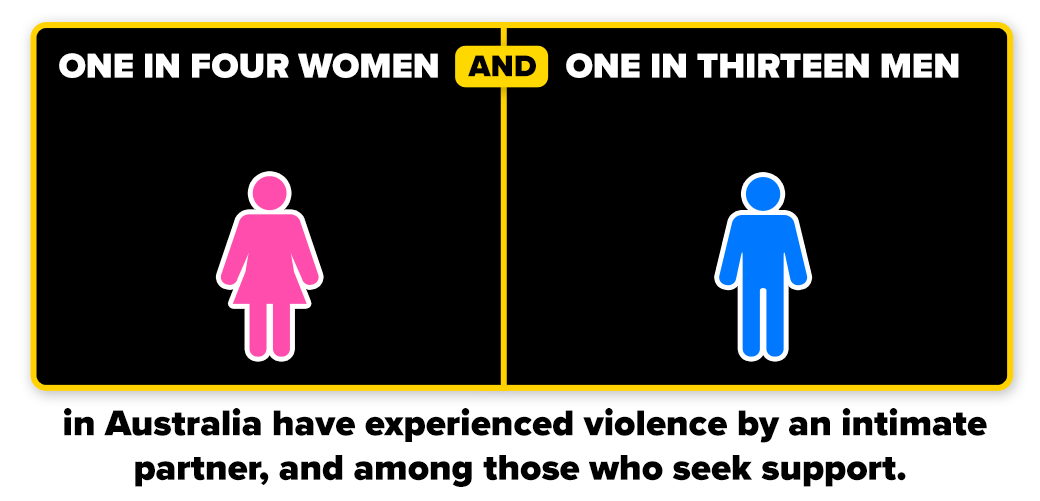Mamamia has launched a new campaign called #ItWasInvisible to shine a light on the unseen stories and signs of financial abuse, along with finance and community partners.
This article contains references to domestic abuse and may be triggering for some readers. If you or someone you know is affected by domestic violence, please call 1800 RESPECT (1800 737 732).
*The women in this story have chosen to remain anonymous. All images used are stock images, via Getty.
The Power and Control Wheel.
At the centre of all abusive relationships are power and control, as demonstrated by the Power and Control Wheel.
Developed in 1984 by staff at the Domestic Abuse Intervention Project (DAIP) in the U.S., the Power and Control Wheel demonstrates the various tactics an abusive partner uses to maintain power and control in a relationship.
On the outside of the wheel are physical and sexual violence. Inside includes the tactics of: coercion and threats; intimidation; isolation, emotional abuse, male privilege, children, and financial (economic) abuse, as well as minimising, denying and blaming.
Economic or financial abuse is one of the least talked about ways of an abuser obtaining power and control, yet women (and men) are falling victim to it every single day.
“We know financial abuse occurs in the vast majority of abusive relationships,” said Baulch.
Approximately one in four women and one in thirteen men in Australia have experienced violence by an intimate partner, and among those who seek support, up to 90 per cent are also affected by financial abuse.


What is financial abuse?
According to Baulch, financial abuse can initially “come under the guise of being caring”.
“Like, ‘I know you’re not good with those sorts of things.’”
It’s also a type of coercive control that “occurs across every single demographic”.
“You could be incredibly wealthy on paper. You might have your name on a family trust, you may have three or four cars in your driveway, you might have…for all intents and purposes a large amount of money in your bank account.
“But if you don’t have access to any of that, or you don’t have any oversight of that, or control of that, then we would consider that financial abuse.”
In the current economic climate, with the fallout of COVID-19 meaning job insecurity and financial instability are rife, this type of abuse is far more likely - and victims of it are even more vulnerable.
“When we talk about financial abuse we often think about someone coming home and taking all the money from the pay packet, and that physical thing of removing their partner’s money,” Baulch said.
For *Lucy, this was the case.
Lucy's story.
When Lucy met her partner *Ben, she was just 20 years old. Ben had been born into wealth and his parents gifted them the deposit for their first home, on the condition that Lucy signed a legal document stating that if the couple split, the money would be returned to them.
"I signed without consulting anyone. I loved and trusted them, as I did their son," Lucy tells Mamamia. "We were married four years later and told that the contract was now void and would be torn up, as we had chosen to spend our lives together. Again, I trusted them."
From the very beginning of their marriage, Ben took charge of the finances. Lucy believed he had a good comprehension of what was best given he'd been around significant amounts of money his whole life.
"All my purchases required approval by him and if not, then I had to have a pretty good explanation. This applied to clothing, household purchases, dinners out, anything really," Lucy says. "I was not granted access to our internet banking, home loan account or share portfolio."
At this time, Lucy was earning a significant salary with monthly commission on top.
"I was told my commission cheques were not to be spent despite it being additional funds to my salary," she says. "Shares were purchased with joint funds without consultation - all in his name. Monetary gifts I received at Christmas or on birthdays were not allowed to be spent and were taken and 'deposited' by him.
"I honestly believed this was him taking care of me, all in the best interest of us, and our goals as a couple."
Lucy gave up career when she fell pregnant with her first child. When she went back part-time when their daughter was 14 months, she was still expected to take care of the all childcare and the household.
"After six long months, I was unable to maintain all household duties, care of our child and a part-time role, I became run-down and fell sick constantly. I regrettably resigned," she says.
When their second child was just eight weeks old, Ben announced he was leaving, telling Lucy he was 'done being a dad'.
It was only when the couple separated that Lucy recognised the extent of Ben's financial and emotional abuse.
After Ben became more and more threatening and aggressive, Lucy was granted a no contact, no exceptions, Family Violence Interim Intervention Order covering both her and her children.
"Two days later I was paying for formula and my credit card was declined. I instantly knew what had happened and broke into a cold sweat. Embarrassed, I quickly I fixed up the bill with the last bit of cash I had and drove to the closest ATM," Lucy says. "There was five-hundred dollars in a shared cash account. As I pinned in the amount and selected ‘withdraw’ the ATM promptly declined my request and swallowed my card. Access to all finances had been cut-off upon Ben being served with the intervention order. "
Lucy is now receiving assistance to rebuild her financial position.
***
The complex nature of financial abuse.
The reality of financial abuse is complex. Some instances are not simply about a man taking charge of the finances as in Lucy's case.
“It’s also things like stopping [a person] accessing Centrelink benefits or childcare benefits, or refusing access to a bank account or a credit card," Baulch says.
“It might be coercing them to do those sorts of things against their will. And then we see this really awful, insidious stuff where that power and control is so focused that it’s… 'I want to see all your receipts for this week, I want you to keep a diary of what you’re spending money on, and you need to justify every single expense to me.' It might be stopping somebody from being able to pay bills, access to resources from the outside, like a car or money for petrol.”
Sarah's story.
For *Sarah, who was financially abused for close to two decades, it was a case of her ex-partner, Max* 'seeing any contribution he made towards any bills or food as him buying a share of her and anything she owned'.
Over the course of the relationship, he refused to contribute anything unless he was provided with a tax invoice. The average weekly contribution he made during the entire relationship for all living expenses and bills was around $100.
"We were both working full-time, but I was paying for everything so while I would live paycheque to paycheque, he was saving like crazy," Sarah tells Mamamia.
Over the course of their relationship, while Max lived off Sarah, he managed to save $850,000 in his own personal bank account.
"I was financially his," Sarah says. "He was the head of the company, and I was his minion."
***
When Sarah met Max, like so many women who end up in abusive relationships, she was emotionally vulnerable, having just moved to a new town as a single mum.
"When I met Max through friends, he was a bit of an enigma, so I felt special whenever he gave me his attention," Sarah says. "It sounds so stupid, but when asked me out, I felt chosen."
He quickly became entrenched in her world, insisting it would make financial sense for him to move in and for them to share her car.
Soon she was paying for everything - the mortgage, food, bills, holidays - Max would simply say, "I owe you some money."
But when it came to payment, he would insist on seeing a tax receipt and would then negotiate down to a smaller amount.
Sarah tried to leave on numerous occasions, but Max always refused to move out of the house they now jointly owned; putting it on the market was out of the question.
Without the money from the sale of that property, Sarah simply couldn't afford to start again.
"I was financially his," Sarah says. "And I couldn't see a way out."
One day, after a violent argument, Sarah left.
"I thought if I didn't get out, I'd be better off dead," she says.
Sarah fled, taking all of her financial documents with her, and made a statement to police before taking refuge in accommodation she maxed out a credit card to afford.
"My mind was so warped by then that I felt silly talking to the police," she says. "I didn't think what had happened was serious enough."
Max was arrested, charged with various offences and an AVO was put in place.
But Sarah's ordeal is so far from over.
"Financial abuse continues beyond their physical removal from your home," she says.
Legal proceedings are still ongoing.
Sarah now suffers from depression and PTSD.
***
Controlling the ability to leave and getting help.
Sarah's story perfectly demonstrates how financial abuse can control a victim's ability to leave a terrifying situation.
“For a lot of women, it can take many, many attempts before they can successfully leave. And often that will be because of finances,” explained Baulch.
“Often people will be trapped in a situation until they can come up with a safety plan in terms of being financially stable and independent and being able to rent or pay a mortgage.
“Using finances as something to keep somebody in a relationship is a very common technique. Particularly when there is a financial imbalance in the relationship to start with.”
“We know that it’s not easy to leave an abusive relationship, particularly if you’re experiencing financial abuse. But there is help available and the first step is reaching out for that help.
“There are several not-for-profit services that are available that can help someone who has been impacted by financial abuse. It may also be helpful to contact your bank to see if they can assist you with immediate management of your account(s), loans and other financial services such as insurance, superannuation. If you're a CommBank customer experiencing a domestic or family violence situation, you can speak to our specialist Community Wellbeing team about your financial needs. This includes situations of financial abuse.
“It can also be helpful to engage a financial counsellor. Financial counsellors provide free, independent and confidential information, support and advocacy to assist people who are experiencing financial difficulty.”
It hasn't been easy but both Sarah and Lucy are on the road to financial recovery and freedom that will take them to a safe place to heal.
If you or someone you know is affected by domestic violence, please call 1800 RESPECT (1800 737 732). In an emergency, call 000.
Instances of domestic and family violence often increase in times of disaster. The coronavirus pandemic is proving to be no exception, with financial abuse also likely to increase. If you’re looking for helpful information about financial abuse, pathways to support, and useful suggestions to help you get back on your feet, CommBank has produced this helpful guide: Financial Abuse, Recognise and Recover.
